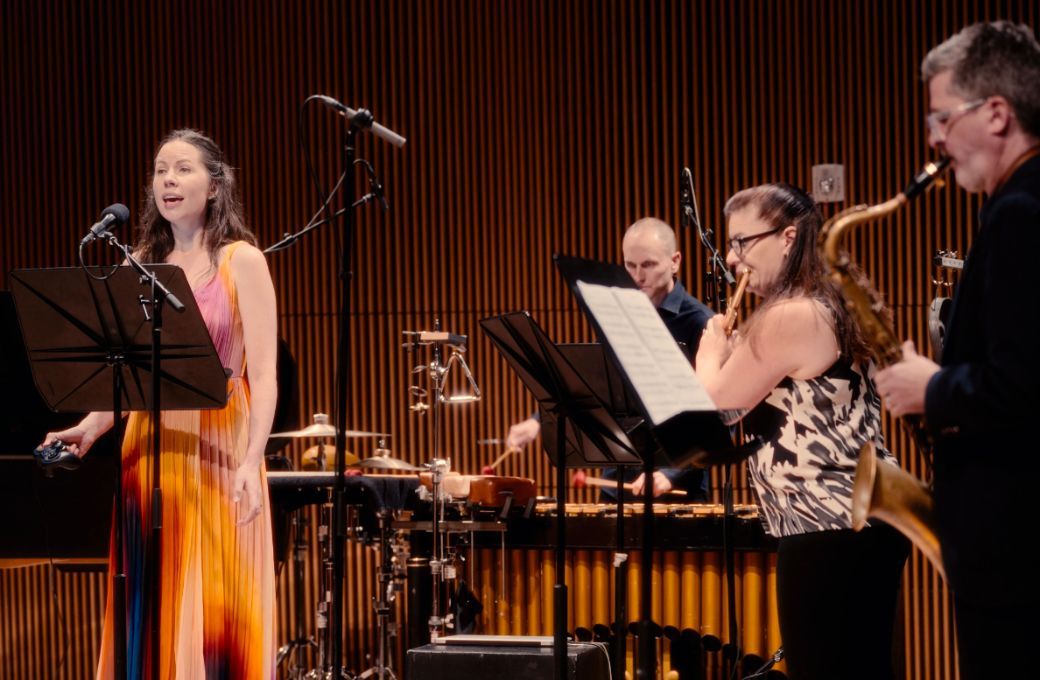The Wet Ink Ensemble presented two works at Manhattan’s Time:Spans festival that were commissioned by the Earle Brown Foundation, the organization behind the festival, seemingly to address two challenges: to make ancient myths palatable to jaded, old cynics; and to create the slowest and most satisfying crescendo ever executed.

Soprano Kate Soper, the resident classicist of the composer/performer octet, is capable of crafting unusual instrumental passages that sound downright impressionistic, like the afternoon of a fairly confused faun. She also manages to sell her often mythic subject matter to a cynical, 21st-century audience, or at least to this jaded and overly pragmatic listener. She makes fairy tale operettas and philosophical song cycles convincing – and sometimes even socially relevant – which can be rather surprising.
Soper set her own bar quite high a decade ago with her first opera, Here Be Sirens. Heard in its world premiere, Epithets is among her most exciting works since then. The text was drawn from appearances of Dawn in The Odyssey and Athena in Orphic Hymns, and if the words weren’t always entirely clear, the feeling was. Her pristine voice was looped, subjected to fairly heavy reverb and, eventually, overwhelmed by a thunderous whoosh by electronicist Sam Pluta, the ensemble’s secret sauce. The score supported the sung lines more in mood than tonality, with saxophone outbursts, heavy percussion and thick harmonic segments from the rest of the ensemble coating but not covering her voice.
Like Epithets, Alex Mincek’s Nomadic Science – also in its premiere performance (each ran about half an hour) – wore its intellect on its sleeve. Inspiration was drawn from texts by poet Comte de Lautréamont, novelists Italo Calvino and William Gibson, and from philosopher Gilles Deleuze and psychoanalyst Félix Guattari. The vocal part (sung by Soper) was spare and largely wordless, but excerpted texts in the program suggested various means of orientation used by birds, cybernauts and machines, as well as through happenstance.
The ensemble roughly tripled in size, and pianist Eric Wubbels moved to the conductor stand, replaced by the brilliant Vicky Chow. Where the electronics were sparse in Soper’s piece, here they prevailed, beginning with a suspended, wavering tone that was complimented in slow, simple variation by piano and harp. It took a surprisingly gradual ascent, eventually gaining critical mass but without thematic statement.
The heavy cloud began to solidify by the conclusion of the first movement, referencing the flight of cranes. The cartography of internet astronauts (as suggested by Gibson) took a quicker pace in the second, flute and harp carrying a theme against quick, Braxtonian, quick orchestral interventions. The third movement (inspired by the endless accidents of Calvino’s If on a Winter’s Night a Traveler), was slow but radiant and transfixing, demanding and perplexing and ultimately offering resolution. It seemed everything had been asked and answered, but a fantastic eruption of noise, glitches and distortion, scratches and squelches, came from the PA in prolonged bursts (in the machine learning segment) sometimes met with orchestral counterpart. It was wildly disconcerting, almost caustic, and lasted only a few minutes.
Time:Spans will mark its tenth anniversary next year, and has grown in size and curation to become a key event on the NYC new music calendar. And Wet Ink, having just completed their 25th season, continues to astound. The concert, in a basement theatre in Hell’s Kitchen, was a match made in heaven.


